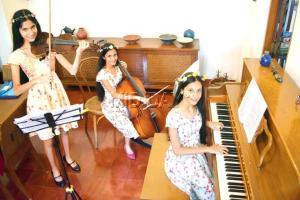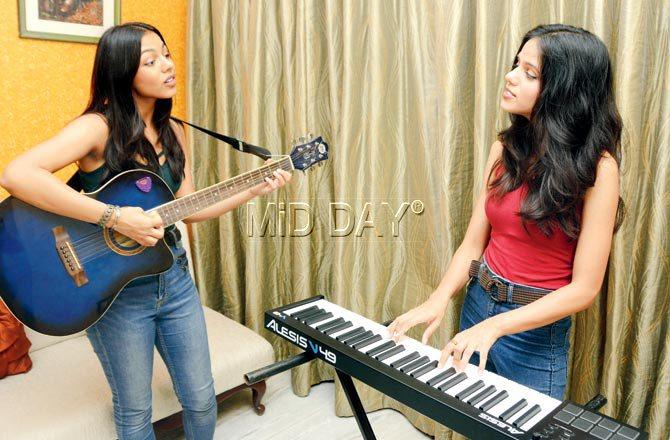Two is company and so is three, especially if you have music in the family. Three sets of siblings tell Benita Fernando what it is like playing together, in music and in life

The Ramakrishnan Trio - Aaliya, Naima and Nisha. Pic/Ashish Raje
'As a trio we can depend on each other'
Aaliya, Nisha and Naima Ramakrishnan
ADVERTISEMENT
In the living room of their Colaba house, Aaliya, Nisha and Naima Ramakrishnan are ready to play a piece for us — a trio by Charles Dancla. Fourteen-year-old Aaliya, the eldest sister, is on her violin and gives them a go ahead with a gentle nod. Then comes the ripple of the Kawai piano and the earthy sway of a three-fourth cello by 12-year-old twins Nisha and Naima. The ensemble's sound fills the room, and we are pretty sure their neighbours would have relished the classical notes wafting into their homes. They call themselves The Ramakrishnan Trio.
"We wanted to call ourselves The Frangipani Three, because we love the flower," says Aaliya. However, their current name came about more organically, from their teachers at NCPA. "When we enter class, the teachers say, 'The Ramakrishnans are here.' They weren't fiddling with names like frangipani." This morning, all three are dressed in matching floral dresses and wreaths for an impromptu session for us. They wear their closed shoes a little grudgingly, but are completely at ease with their instruments. We saw The Ramakrishnan Trio first perform Klengel's Kindertrio a few weeks ago for the public at the NCPA, having done school concerts before. Their teachers got them to practise simpler arrangements initially, such as Twinkle Twinkle, before moving on to more complex ones. "It made sense for us to come together. There are more music groups in school, but it's difficult to practise because they are at different ends of the city. The easiest part about playing as a trio is that we are sisters. We are one unit," says Naima.
"Playing solo is more stressful because the focus is on you. As a trio we can depend on each other," says her twin, Nisha. On the request of a neighbour, they played Pachelbel's Wedding March, and also Neapolitan Dance from Swan Lake for their grandparents' wedding anniversary. They have also been making videos for their mother, children's writer Shabnam Minwalla. "It's more enjoyable when we play together — we are able to look at each other and interact better," says Naima. All three study at the Bombay International School, and started training in music at a very young age. They had a range of instruments to choose from, but when you see them as a trio, you may feel that each instrument has found the right owner. It's almost like The Sorting Hat from Harry Potter did the job for them. Naima likes the dynamism of the piano, while Nisha loves how grounded a cello feels, and Aaliya found her sound in the violin.
"As students, we are asked to learn the piano for a while, to understand composition and accompaniment," says Nisha. However, when she had to go for classes, her twin tells us, Nisha would develop mysterious ailments. "She doesn't like the piano or the violin!" the sisters exclaim. Nisha's hands, in fact, bear the marks of a young cellist — her left hand fingers, which stretch on the strings, are far longer than the right. "I cannot wait to start playing a full cello but I will have to wait" she says. "We chat a lot with each other and also confide in each other. But, that leads to arguments too," says Aaliya. Usually, it's the pianist against the violinist, we are told. "I think it's because we try to steer the practise in our direction," says Aaliya. The cellist, instead of playing peacemaker, resorts to her favourite activity, reading.
'We don't rehearse together; it's natural'
Ragini and Nandini Shankar
It is a tradition in the Shankar family that when a child turns three, she is handed a violin. The child may tinker with it, but, as Ragini and Nandini Shankar will tell you, their riyaaz started quite young as daughters of noted violinist Dr Sangeeta Shankar, and granddaughters of Padma Bhushan awardee Dr N Rajam. "As a child you don't know what you are interested in. You just go with whatever your parents tell you to do. As I became older, I realised the value of what I had," says Nandini, 25. It is a story shared by her elder sister, Ragini, 28, who tells us, "We are privileged to be born in a family with such a rich tradition, and have the honour of carrying forward the legacy."
Together with Sangeeta, the three women are Instrings, a trio of violinists who play everything from Indian to Western classical to folk and jazz. "When we play together at home, the atmosphere is very light-hearted. We are open to each other's suggestions; it's a fluid environment," she says.

Team Instrings: Mother Dr Sangeeta Shankar with daughters, Ragini and Nandini. Pic/Inni Singh
One would think that as the older sibling, Ragini would have the advantage of age, but that's not the case, she says. While she started training in Carnatic early on, both sisters began Hindustani together. "We help each other, and our experiences were shaped together," she says. The Shankar girls had as their gurus both their mother and grandmother, and they unanimously tell us that their training had been pretty strict. They don't do their riyaaz together, as it is important that you hear yourself and fine-tune your skills, says Nandini. "On stage, we have a really good rapport, but the truth is that we don't rehearse together. It is a natural friendship that we have," says her elder sister.
While Nandini sings as a hobby, both of them have never tried any other instrument. "The violin is what comes closest to replicating the human voice," Ragini says, adding, "It has a sonorous tone to it, and was handed to me by my grandmother." Be it shopping for anarkalis for their concerts or listening to their favourite artistes, the sisters have their differences, but none that get too overwhelming. Ragini says, adding, "There are disagreements, but there is also a lot of love. Isn't every relationship like that?"
The thing that the sisters cherish the most with each other is travelling. Having been to many countries from the US to Hungary, the violinists have been able to tick off a number of places on their bucket list. When they got a chance to do their Masters in Music from the SNDT University, it was a welcome opportunity. Ragini is a graduate in mechanical engineering from the Don Bosco Institute of Technology, Kurla, while Nandini is a chartered accountant, but they found their common love for music come together in a classroom. Ragini tells us, "We share all our secrets with each other, and advise each other on important matters." Nandini adds, "I am very happy to have found a best friend in the form of my sister."
'We operate through sister telepathy'
Riya and Simran Duggal
Riya and Simran Duggal cannot remember ever being taught how to do a harmony. "I think it just came naturally to us. My earliest memory is of my family in a car, and the four of us singing to songs on the radio," says Riya, 21. Always harmonising, her younger sister, Simran, and she decided to name themselves about two years ago. Today, they are a pop and alternative rock duo called Simetri, derived from their names. "It's Sim and Ri, joined by et — French for 'and'," says Simran. But, that's not all there is to it, says Riya. "It's also because we are quite alike in a lot of ways, and we think a lot like each other."

Riya and Simran call themselves Simetri. Pic/Sneha Kharabe
When we meet them at their home in Lokhandwala, the sisters, dressed in jeans and strappy tops, seem like mirror images of each other. We are not the first to mistake them for twins, we are told. As we talk to them, their personalities come through quickly — Riya the calmer, more composed elder sister, and Simran, 19, the chattier, bubbly sibling. They also speak as if they are in harmony, alternating sentences between them. "It happens a lot to us," says Riya. "When people talk to us, Simran and I exchange a knowing glance. It's sister telepathy," she smiles.
Even as they do gigs about town as Simetri, the sisters study at The True School of Music, and also train in dance together. Simran plays the keyboard, while Riya plays the guitar. They also perform with singer Shalmali Kholgade. Last year, Simran was chosen to be a part of a pop bootcamp by Simon Fuller, the creator of the Idol series. "We got used to being in a studio right from our childhood," she says, referring to their parents. Daughters to music composer Rajiv Duggal and singer Melanie, the sisters say they have gained a lot from them. Rajiv was best known as the composer for the hit TV series from the 1990s, Zabaan Sambhal Ke. He was also the voice of Sebastian in the Hindi version of The Little Mermaid.
As the sisters settle down to play for us, Simran says, "The best part about being sisters is that we get to practise whenever we want. We sleep on the same bed, so we often lie next to each other, doing harmonies." Do they ever plan to write a song about being sisters, we ask. Riya, the songwriter of the duo, says, "I have tried but it is so hard!" Simran throws a wicked smile our way, and with a toss of her hair, says, "I have one in mind, but I will have to rewrite it before I show it to Riya."
Catch up on all the latest Mumbai news, crime news, current affairs, and also a complete guide on Mumbai from food to things to do and events across the city here. Also download the new mid-day Android and iOS apps to get latest updates
 Subscribe today by clicking the link and stay updated with the latest news!" Click here!
Subscribe today by clicking the link and stay updated with the latest news!" Click here!






